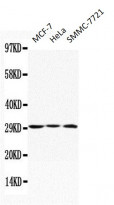ARG58216
anti-Apolipoprotein D antibody
anti-Apolipoprotein D antibody for Western blot and Human
Overview
| Product Description | Rabbit Polyclonal antibody recognizes Apolipoprotein D |
|---|---|
| Tested Reactivity | Hu |
| Tested Application | WB |
| Host | Rabbit |
| Clonality | Polyclonal |
| Isotype | IgG |
| Target Name | Apolipoprotein D |
| Antigen Species | Human |
| Immunogen | Synthetic peptide corresponding to a sequence at the C-terminus of Human Apolipoprotein D(172-189aa IDVKKMTVTDQVNCPKLS). |
| Conjugation | Un-conjugated |
| Alternate Names | ApoD; Apo-D; Apolipoprotein D |
Application Instructions
| Application Suggestion |
|
||||
|---|---|---|---|---|---|
| Application Note | * The dilutions indicate recommended starting dilutions and the optimal dilutions or concentrations should be determined by the scientist. |
Properties
| Form | Liquid |
|---|---|
| Purification | Affinity purification with immunogen. |
| Buffer | 0.9% NaCl, 0.2% Na2HPO4, 0.05% Thimerosal, 0.05% Sodium azide and 5% BSA. |
| Preservative | 0.05% Thimerosal and 0.05% Sodium azide |
| Stabilizer | 5% BSA |
| Concentration | 0.5 mg/ml |
| Storage Instruction | For continuous use, store undiluted antibody at 2-8°C for up to a week. For long-term storage, aliquot and store at -20°C or below. Storage in frost free freezers is not recommended. Avoid repeated freeze/thaw cycles. Suggest spin the vial prior to opening. The antibody solution should be gently mixed before use. |
| Note | For laboratory research only, not for drug, diagnostic or other use. |
Bioinformation
| Database Links | |
|---|---|
| Gene Symbol | APOD |
| Gene Full Name | apolipoprotein D |
| Background | This gene encodes a component of high density lipoprotein that has no marked similarity to other apolipoprotein sequences. It has a high degree of homology to plasma retinol-binding protein and other members of the alpha 2 microglobulin protein superfamily of carrier proteins, also known as lipocalins. This glycoprotein is closely associated with the enzyme lecithin:cholesterol acyltransferase - an enzyme involved in lipoprotein metabolism. [provided by RefSeq, Aug 2008] |
| Function | APOD occurs in the macromolecular complex with lecithin-cholesterol acyltransferase. It is probably involved in the transport and binding of bilin. Appears to be able to transport a variety of ligands in a number of different contexts. [UniProt] |
| Cellular Localization | Secreted. [UniProt] |
| Calculated MW | 21 kDa |
| PTM | N-glycosylatd. N-glycan heterogeneity at Asn-65: Hex5HexNAc4 (major) and Hex6HexNAc5 (minor); at Asn-98: Hex5HexNAc4 (minor), dHex1Hex5HexNAc4 (major), dHex1Hex6HexNAc5 (minor) and dHex1Hex7HexNAc6 (minor). [UniProt] |
Images (1) Click the Picture to Zoom In






